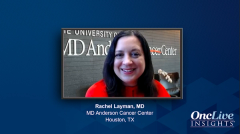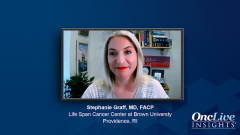
Individualizing Care with CDK 4/6 Inhibitors
Stephanie Graff, MD, and Rachel Layman, MD, discuss how to individualize care with CDK4/6 inhibitors in patients with high-risk early breast cancer.
Episodes in this series

Transcript:
Stephanie Graff, MD, FACP: Thirty percent of the patients on monarchE [NCT03155997] got tamoxifen. Looking at the data, a relatively small percentage of them got tamoxifen with ovarian function suppression. So there’s probably a group of patients on tamoxifen alone that are still candidates for adjuvant abemaciclib. Let’s say our patient starts on AI [aromatase inhibitor] ovarian function suppression abemaciclib and is miserable, not with what we think to be abemaciclib adverse effects but with AI or ovarian function suppression adverse effects like hot flashes or night sweats or mood disorder, are you de-escalating? Are you changing the endocrine therapy backbone to tamoxifen alone and continuing the CDK4/6 inhibitor in the early-stage setting?
Rachel Layman, MD: I think that because there were a significant number of patients that did get tamoxifen, I think this is great data to have and I think it gives physicians the flexibility to make changes in the endocrine therapy if they need it. These are all high-risk patients. I think, as much as possible, we should try to encourage them to take the most effective therapy and do everything we can from a supportive care standpoint to help them tolerate these medications. One thing that is important in oncology is the best drug is the drug that a patient will take. We know that a lot of patients stop taking their endocrine therapy and don’t inform their physicians and I think you have to really encourage an open dialogue with patients so you’re making sure that they’re taking something. Tamoxifen is still a very good drug. I think it is not preferable in this situation, but I’d rather them take tamoxifen than not take their therapy.
Transcript edited for clarity.






































